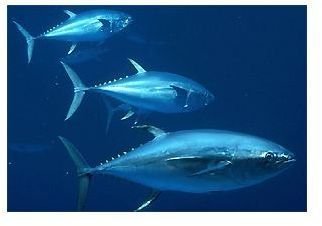Health Benefits of Tuna and Mercury in Tuna
Health Benefits of Tuna
Tuna are cold water fish. There are several species of these ocean-dwelling carnivorous fish, ranging in sizes from 1 to 15 feet in length.
Tuna is packed with valuable nutrients. It is very popular among athletes because it is an excellent source of protein. Tuna is low in calories and high in vitamin A, vitamin B3 (niacin), vitamin B6 (pyridoxine), vitamin B1 (thiamin), selenium, iron, phosphorus, potassium, magnesium, and omega-3 fatty acids.
The health benefits of tuna on the cardiovascular system are many because of the omega-3 fatty acids. Omega-3 fatty acids help keep blood inside arteries from clotting (cause of most heart attacks), help prevent erratic heart rhythms, help improve the ratio of good and bad cholesterol, and help prevent cholesterol from turning into artery-clogging plaque. Tuna helps lower triglycerides, prevent atherosclerosis, high blood pressure, and reduces the risk of stroke.
Helping in the treatment of arthritis symptoms and helping in the prevention of childhood asthma, macular degeneration, pulmonary embolism, deep vein thrombosis, Alzheimer’s disease, and cancer are other health benefits of tuna.
Mercury in tuna
Mercury is a heavy metal that can be toxic if large amounts are consumed. Mercury poisoning can damage the lungs, kidney, and brain. Typical symptoms include lack of coordination and impaired vision, speech, and hearing.
Tuna is highly nutritious and you can still benefit from tuna, but it should not be consumed in excessive amounts.
Children 12 years and under, and women who are pregnant, may become pregnant, or nursing should eat (cooked) no more than 12 ounces per week (tuna steak and albacore tuna should be limited to 6 ounces per week). This includes other fish and shellfish with low levels of mercury. Fish and shellfish with high levels of mercury should be avoided.
Levels of Mercury in Tuna and Other Seafood by the FDA
Tuna also contains purines (which can form uric acid) and people who suffer from gout, kidney stones, or other purine-related problems should avoid eating tuna.
Disclaimer
Please read this disclaimer regarding the information contained within this article.
